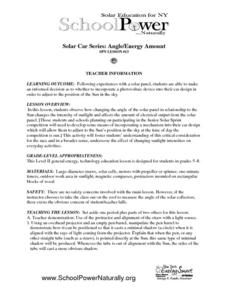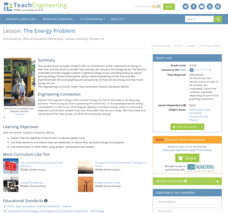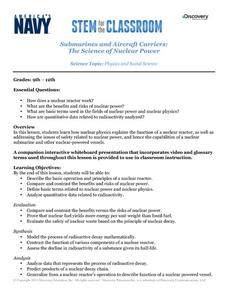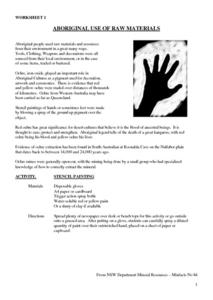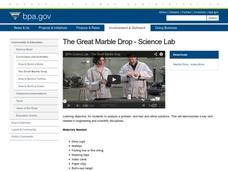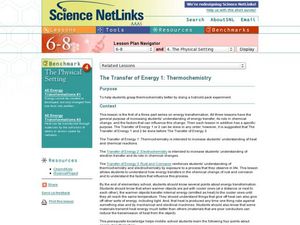Government of South Australia
Don't Waste Your Energy
Don't lift another finger, this physical and environmental science unit has everything you need to begin teaching your class about energy. Starting with a look at the greenhouse effect, these lessons and activities take young scientists...
It's About Time
Energy Flow in Ecosystems
Emerging biochemists more fully understand the flow of energy in ecosystems as they explore the laws of thermodynamics and relate them to energy transfer in food chains. They also investigate heat loss from the human body and how...
Curated OER
The Transfer of Energy 2: Electrochemistry
Students study about electrochemistry by increasing their understanding of electron transfer and its role in chemical changes. They explain that energy appears in different forms. Heat energy is in the disorderly motion of molecules.
Serendip
How Do Biological Organisms Use Energy?
When an organism eats, how does food become energy? Young biologists follow glucose through the process of cellular respiration to the creation of ADP using a discussion-based activity. The resource also highlights conservation of mass...
Mr. E. Science
Energy and Power
Teens often display potential energy in class and kinetic in the hallways. This third presentation covers the six types of energy, each in potential and kinetic form. It also covers the Law of Conservation of Energy and Einstein's Theory...
Curated OER
The Transfer of Energy 3: Rust and Corrosion
Students research the type of chemical reaction that occurs when metal rusts. They conduct an experiment looking at the rate of corrosion in steel wool. This is lesson three in a three lesson unit on the transfer of energy.
American Chemical Society
The Energy Efficiency of Heating Water
Can a small change in laboratory procedures save energy? Scholars test three different methods for heating water in a science lab. Then, they calculate the energy efficiency for each and compare them to determine which uses the least...
Curated OER
Solar Car Series: Angle/Energy Amount
Does the angle of a solar panel change the output? Emerging engineers find out! Demonstrate for your class how they can angle a straw to match the angle of light rays coming from a source. Then turn them loose to experiment with the...
Curated OER
Energy Resources: Where Are They and How Do We Get Them?
Future energy engineers visit several stations, each one dedicated to a different alternative source of energy. They describe how solar energy is converted into other forms of energy, the patterns of distribution of energy resources in...
Curated OER
Energy Conservation Games
Middle school physicsl science explorers play a game using dominoes that you have photocopied onto cardstock. Through the game, they familiarize themselves with the conservation of energy and the transformatin from one form to another....
Curated OER
Solar Energy in New York
Middle schoolers examine a variety of information for New York State including insolation data, and economic or political data, thus incorporating both science and social studies. Encouraging learners to become concerned citizens as they...
Curated OER
Energy Solutions; A Brochure
By creating an energy brochure, teams of science learners inform others about the advantages of using alternative energy sources. An instructions page for your class and a grading rubric are provided. The lesson plan focuses on...
Teach Engineering
The Energy Problem
Think you can solve the energy problem? You'll first need to know about current energy use. Analyzing a set of circle graphs lets scholars see where energy consumption is the greatest, both by sector and by household use. They develop a...
Curated OER
Chemical Reactions and Energy
The details here give definitions about chemical reactions and the energy transfer in those reactions. The reactions given include general examples of catalysts, inhibitors, and other situations that affect the rate of production and...
Teach Engineering
Solar Power
Elementary schoolers discover how engineers use solar energy to heat buildings. They take a close look at some of the materials used: sand, salt, water, and shredded paper and evaluate the efficiency of each material. An incredible...
Discovery Education
Submarines and Aircraft Carriers: The Science of Nuclear Power
As physics masters view this presentation, they learn how nuclear power is used in submarines. They use Google Maps to plot a course through the ocean and calculate the time required for surfacing and traveling. They learn about fission,...
PBS
Blow the Roof Off!
Blow the minds of young scientists with this collection of inquiry-based investigations. Based on a series of eight videos, these "hands-on, minds-on" science lessons engage young learners in exploring a wide range of topics from making...
NSW Department Mineral Resources
Aboriginal Use of Raw Materials
What's the difference between base metals and precious metals? Experimenting with natural metals is an interesting way for kids to learn about the world around them. Use a resource that contains over 30 pages of worksheets and...
NOAA
What's the Big Deal?
Who knew that a possible answer to Earth's energy resource problems was lurking deep beneath the ocean's surface? Part four of a six-part series introduces Earth Science pupils to methane hydrate, a waste product of methanogens. After...
Curated OER
Bond Energies
Before completing this learning exercise, chemists are supposed read a portion of their textbook. Assign the chapter on bond energies, endothermic, and exothermic reactions. Then have your class answer the questions and fill in the data...
Bonneville
The Great Marble Drop
Mike and Kellie, a team of electrical engineers, demonstrate how to to design a contraption that accurately drops a marble onto a target. The materials needed and general instructions are provided on the website or via a downloadable...
PricewaterhouseCoopers
Waste and Recycling: Recycling and Energy Recovery
Reduce, reuse, recycle, and recover. Young environmentalists learn about the overwhelming amount of garbage produced and discover better ways to minimize their impact on Earth by learning the difference between garbage and recyclables.
Curated OER
The Transfer of Energy 1: Thermochemistry
Budding chemists achieve a basic understanding of the role of heat in chemical reactions. An online worksheet gives learners instructions and questions to answer as they investigate the Chem4Kids website and perform a hands-on lab...
Curated OER
Ice Cream: a Taste of Science!!
Students define the term solution. They explain conservation of energy and energy transfer as it relate to how the milk solution became ice cream. Students are able to explain freezing point depression.









